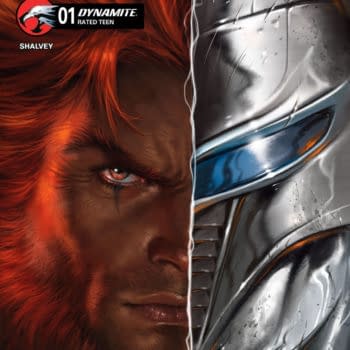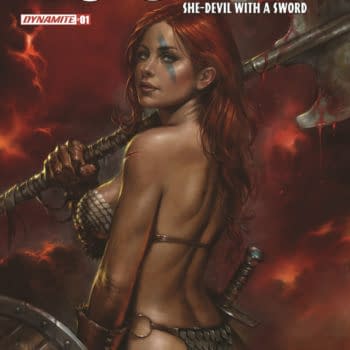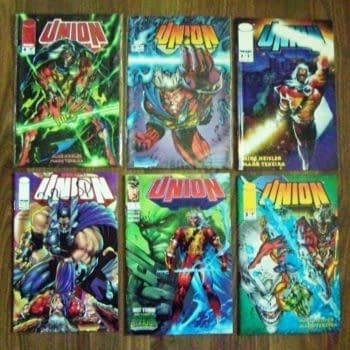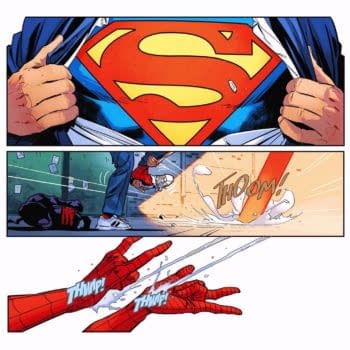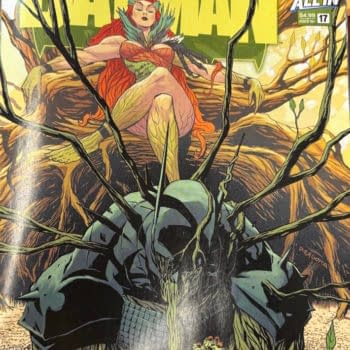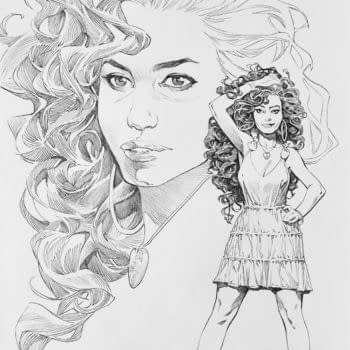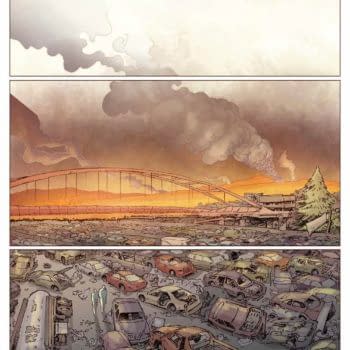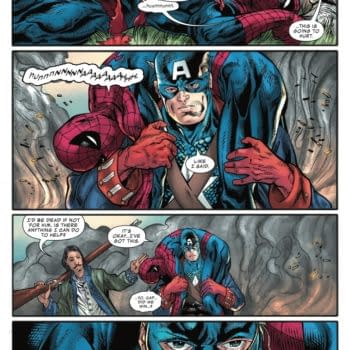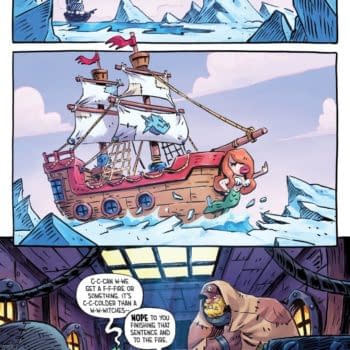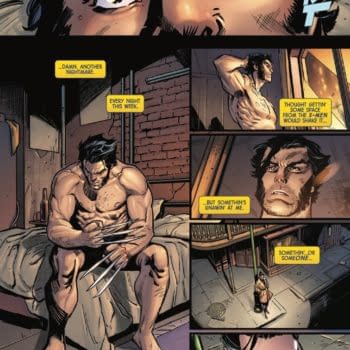Posted in: Comics, Recent Updates | Tagged: Comics, eric stephenson, image
The Bleeding I – Q&A With Eric Stephenson Part Three
Eric Stephenson is publisher of Image Comics. He is also one of the few publishers willing to be directly interviewed by Bleeding Cool. At least one other asked to be in the light of our earlier interviews, but on receiving the questions, suddenly declined.
So we're doing it again.
Rich: So. San Diego. Image announced a shed load of new comic books, some from massive names, some from brand new creators whose work we've never seen before,… and yet people seemed to mostly be talking about Harley Quinn's new costume or what colour the Incredible Hulk was now. Does this kind of thing get you down?
Eric: Well, no, because that wasn't my experience, and judging from the comments I read online immediately after the show, I don't know that what you're saying is particularly representative of the general consensus. As near as I can tell, Brian K. Vaughan's return to comics was the biggest announcement of the show, and I read an awful lot about how impossible it was to get into the Walking Dead Season 2 panel. Apart from that, Trickster seemed to have great buzz, and I heard lots of people talking about that big Walt Simonson Thor book from IDW, which strikes me as fair, because Walt's amazing, and that book is a thing of beauty.
Rich: Yeah but, you know… we now have a half latino, half black Spider-Man… didn't Image do that with Shadowhawk and Savage Dragon? Is it important that someone like Marvel does this kind of thing?
Eric: And how about Spawn? A friend of mine just started getting into comics again after a few years in the wilderness, and since he used to read Spawn, I gave him a copy of the latest trade. He texted me a couple days later and asked, "Why did I think Spawn was black?" and I responded that Al Simmons, the original Spawn, was black, but he died in Spawn #185 and was replaced by Jim Downing, a white character who appeared very briefly in one of the series' earliest issues. The next time I saw my friend, he told me that when he was a kid, lots of kids he knew bought Spawn specifically because he was black, that they thought that was really cool.

None of that takes away from what they're doing, obviously, but yeah, it's not like there haven't been black superheroes before now. I mean, Stan Lee and Jack Kirby created Black Panther in the '60s, and there have been many others since then. The Punisher was even black for a little while back in the '90s. And as far as Spider-Man's concerned, well, Spider-Man 2099 was hispanic, wasn't he?
Really, it all comes down to what I was just saying about Robert and Invincible. If it makes sense and it's a good story, then good for them.
Rich: In the bars and on the floor, the bigest buzz I found was over the New 52 books from DC – and from the retailers, the move to day-and-date digital. A shot in the arm for the industry, or pure poison?
Eric: We're going to find out, aren't we?
All those new first issues… I thought it was an interesting idea back when it was kind of a water cooler story, back in the early '90s when I was first working in comics and learning about things like that for the first time. I was never a huge DC fan, but when I found out they'd considered re-launching everything after Crisis on Infinite Earths, I was really fascinated by how that might have worked out. Within a couple years, though, there was that Zero Hour thing and all the zero issues, and that made it seem like they kind of blinked back in 1986. These days… Well, there was just a new Daredevil #1, there's a new Uncanny X-Men coming out soon, and we're already on the third Ultimate Spider-Man #1. Judging by the ads for Fantastic Four #600, I wouldn't be terribly surprised if there was a second FF #1 within a few months, too. I'm not sure how ground-breaking a bunch of new first issues really is at this point, you know?
And I think moving to day-and-date is kind of a non-issue. Comics are available day-and-date now, but the big difference in a lot of cases is they're available for free on pirate sites. When we went day-and-date with The Walking Dead, our print sales were not affected in the least. Other books went day-and-date and it was the same thing. For a while it was like screaming into the wind, but I think people are slowly coming around to the fact that selling comics digitally isn't a whole lot different from selling them down the bookstore. It's a just a different method of delivery, and if it means more people are going to be reading comics, then that's good news for everyone in this business.
Rich: Talking of different methods of delivery, Image seems to be party to the comic industry's continual race to sell less and less printed comics, while still selling very few digital comics. What's going on from your perspective right now? What is the future of the single printed comic? Bob Wayne talked in London yesterday about the comic moving to the high end graphic novel, that digital can't produce. Considering Image does a fair line in these already, does he have a point?
Eric: You know, there seems to be an ongoing tendency to render the entire digital conversation in black and white, as print versus digital, but I think most people are getting pretty used to having their entertainment in a variety of formats at this point. I know people who stream movies and TV online, but also buy DVDs and watch shows on their televisions. People listen to music on their iPods when they're out and put on a CD or a vinyl record at home. Now books, magazines and comics come in different formats, and if you want those things in different formats, I don't see how that's anything other than great. You can't lug all your books or comics around when you're traveling or commuting, but you can do exactly that with an iPad.
I can see comics eventually switching to a model wherein stories are serialized digitally and then collected both digitally and in print. I imagine the world's forests might breathe a sigh of relief at that point, but the bottom line is that if people want printed single issues to exist, they'll continue to exist. I don't know if they'll remain in their exact current format, but I do think there's something special and unique about monthly comics that is worth preserving. If we treat them like disposable pamphlets, then sure thing, they'll go the way of disposable pamphlets. If we treat them like they have a little more value than that, well, I think that's another conversation altogether, because there are actually a lot of things about the printed page that you can't reproduce digitally.
Honestly, it's an exciting time for comics, because all this new technology is going to make us – force us, in some cases – to explore all kinds of new and different options, not just for how we format and distribute digital comics, but print comics, too. High end graphic novels might well be part of that, but I think our horizons are pretty open at this point. We don't need to limit ourselves.
Rich: Okay, but looking at Robert Kirkman's Skybound, with media rights being part of the deal with creators, or the Dave Elliot books, or the Collider books, is that chipping away at what people may have considered Image Central books – and that comics-first ethos? When media deals are done at the outset, it seems to indicate that media deals were considered from the outset.
Eric: Well, with Marc Guggenheim and Collider, and with Skybound, I think it's more a case of these guys wanting to tell certain stories and realizing that their success has created a greater likelihood for that material to be adapted into other media. I mean, when Robert started out, when he was doing things like Battle Pope and Tech Jacket and Invincible and then The Walking Dead, turning something into a television show or a movie or a toy or whatever was a pretty distant thought. Now, he'd be stupid not to think there's going to be interest in what he does next, and Skybound was set up to capitalize on that potential interest, most definitely. Same with Collider.
At the same time, years ago, when I was working with Alan Moore on Supreme at Awesome, I remember him telling me that the rights to League of Extraordinary Gentlemen had been picked up, well before comic had even been announced. So there was a media deal done at the outset on that, but I don't think anyone would argue that League of Extraordinary Gentlemen read like a movie pitch. Even with a media deal in place, I think that series and everything that came afterwards lived up to the "comics-first" ethos. With some creators, there really isn't any other way of thinking about it, even if other opportunities do exist. They're storytellers first, and they want to tell the stories they want to tell. If they can get money from other avenues to keep them going, why should that be held against them?
Rich: After Walking Dead and Chew, there seem to have been a few more sales of Image comics as movies/TV shows, The Vault announcing a deal in the same week it was published. I noted Dave Elliott's role in that book, formerly of Radical Publishing who seem to be publisher based on that very possibility. Now obviously Image doesn't work in that way, but is there a danger of it being used by people who do? I'm also reminded of Cowboys & Aliens here…
Eric: The big difference between things like The Walking Dead or Chew and something like Cowboys & Aliens, is that I don't think Robert Kirkman or John Layman ever imagined their series being turned into anything other than comics. They did those books because they had stories they wanted to tell, and their primary goal was to be successful enough that they could continue telling those stories. And they ultimately succeeded because people seem to value something that has real heart to it, a story readers know the creators really wanted to tell, over the kind of contrived "get-rich-quick" scheme comics produced solely to get a nod and a wink from some development executive.
Rich: Talking of get-rich-quick schemes – that seems a cue to ask you of your thoughts about the Kickstarter-busting Womanthology?
Eric: You know, I've been kind of watching all of this from the sidelines, and I'm not sure it has much to do with Image. We publish the books that are pitched to us – we don't hand out assignments. I don't work at Marvel or DC, so I can't tell you how they do things there, but I do know we don't get many pitches from women. When we do, I give them the exact same consideration I would give a pitch from a man. It's either good or it isn't, and that's really all I care about. I mean, maybe I'm not like everybody else, but I don't really sit around and separate people into different groups. It has nothing to do with political correctness, it's just not how I'm wired.
It's like – here. I'm going to tell you a couple stories real quick.
A few years ago, after Image had been in Berkeley for a few years, a creator who will remain nameless called me up quite out of the blue and said, "Hey, I was just looking at the credits in one of your books, and I noticed that over half the Image staff is Asian. I think that's pretty cool. Had you noticed that?" and I literally pulled the phone away from my ear and looked at it as if someone had just offered to lend me a turd. And then I said I hadn't noticed, but okay. This person then asked how I couldn't have noticed that, and counted out the number of Asian employees Image had on staff at the time. And I was like, yeah, I understand how math works, what's your point, exactly? I hired them because they were qualified for the job, I didn't sit and deliberate on anything beyond that.
Now, a while before that, when Jim Valentino was still publisher and I was handling marketing, we had a meeting with a woman pitching a book with a friend of hers. Both of them had worked in comics for a while, and both had been published by Image. It was a fine meeting, but what really stuck with me was that after they left, Jim said that every time he saw this particular woman, it reminded him of something she'd said to him at the end of a previous meeting, which was basically that she was glad there wasn't a "casting couch" at Image, because that definitely wasn't the case everywhere. I mean, she actually said it in more graphic terms than that, but whatever the case, I was dumbfounded. That was really kind of a weird moment for me, because it just never occurred to me that any comic book publisher would have a "casting couch." I mean, really?
So, that's where I'm coming from – I don't sit around and worry about gender or ethnicity. What this business runs on is talent. Talent and creativity. Gender shouldn't have anything to do with it. Race shouldn't have anything to do with it. All that matters is if someone has good ideas and can transfer them from their head to the page. That's it and that's all.
We have published books with stories by women and we've published books with art by women. Two of our biggest announcements in San Diego were comics drawn by women, and next year we'll have Saga by Brian K. Vaughan and Fiona Staples, and we'll have MacGyver by Lee Zlotoff, Tony Lee and Becky Cloonan. I was pitched a book with Camilia d'Errico at the con, and I approved it on the spot. A couple days later, Natalie Nourigat asked if Image would be interested in publishing her autobio comic Between Gears. Done and done. She was recommended to us by Emi Lenox, because we published her Emitown book here, and she's working on the second volume of that, plus a new monthly series. What they all have in common isn't their gender, it's that they're awesome.
Last year, Marian Churchland won the Russ Manning Award for Best Newcomer for her Image graphic novel, Beast. This year, Nate Simpson won it for the first issue of Nonplayer, and there's absolutely no difference to me. She's a woman, he's a man – so what? They both do amazing work, and I am proud to be associated with anyone who can do what they do. Talent and creativity. Fire and skill. That's all the matters.
Hopefully, Womanthology has those qualities in abundance.
Rich: With Butcher Baker and the like, you seem to be publishing edgier material than we may have expected from Image. You also seem to have increased your work with the CBLDF? Is there a correlation here?
Eric: I guess the short answer is "no," but I agree, we've been a lot more vocal about the work we do with the CBLDF this year. Our involvement with the Fund during 2011 is about the same as it has been for years, though. We've co-sponsored the Fund's annual Welcome Party at Comic-Con International in San Diego every year since 2006, and we've been involved with the Liberty Annual project on an ongoing basis since 2008. In years past, we've also co-sponsored CBLDF events in New York and San Francisco, plus we've been corporate sponsors of the Fund since before I started working here. Our relationship with the Fund is as important now as it ever was, and I don't anticipate that changing.
Rich:Well, Image recently announced a ratings system, which has historically been a controversial thing in comics. What's the reaction been like from retailers? Creators? Book stores?
Eric: I think, in the past, the controversy has stemmed from arbitrarily slapping a label on something in an effort to appease censors, but we're really just trying to make retailers as well-informed about what they're selling as possible. The whole idea originated with retailers, and based on conversations I've had so far, they appreciate the effort. Everyone seems fairly satisfied with how it's working out.
Rich: Looking at the New York Times bestseller numbers, I noticed that The Walking Dead seems to make up a massive percentage of bookstore sales. Does that make it easier for other Image titles to find an audience alongside it, or does barge them out of the way?
Eric: A little of column A, a little of column B.
Bookstores order what they can sell. When I visit other cities, I always take some time to check out the local shops, and sometimes I'll see a nice variety of Image titles, other times, I'll just see The Walking Dead and a handful of others. I've been to stores that only have The Walking Dead and Spawn, and honestly, if that's what they can sell, I'm totally fine with that. I'd prefer stores order things their customers are going to buy rather than stocking everything and then sending us a truckload of returns.
As long as I've been at Image, my position has been that I don't see the point in forcing bookstore buyers into buying things they're just going to send back. That costs all of us money in the long run, and that's the best case scenario. Worst case… Well, look at Tokyo Pop.
And something else that isn't said often enough, even though it's a pretty simple truth, is that comic book stores remain the absolute best places to buy trade paperbacks and graphic novels. A good comic book store is more likely to stock close to a publisher's entire line of trades than even the best chain shop, and better still, they're better equipped to answer customers' questions. It's nice to have comics in bookstores, but comic book stores still get the job done better when comes right down to it.
Rich: There seems to be a general perception in some quarters that Robert Kirkman's success is the major factor shaping Image's overall success these days. Fair or unfair?
Eric: Robert wouldn't have been asked to become a partner in the company if he wasn't acknowledged internally as a major factor in shaping our success over the last few years, so I'd say not only is that assessment fair, it's "duh." You know what I mean? It's not like it's some deep, dark secret – it's something we're proud of. If there's someone out there who thinks we're ignorant of Robert's contributions or embarrassed by them, they're seriously mistaken. Seven guys started Image and four of them steered things along for many years, but they didn't even consider inviting anyone else to join until Robert came along. I think that speaks volumes, not just about Robert, but about Erik Larsen, Todd McFarlane, Marc Silvestri and Jim Valentino and the kind of company they created. I mean, that's certainly not how Jack Kirby was rewarded for all his hard work at Marvel, is it?
Rich: Wasn't Dave Sim invited?
Eric: He wasn't, no. I've been associated with Image in one way or another since the company started, and I've never, ever heard that, not even as a rumor. You can ask Larry, you can ask Jim, you can ask Todd – we all have a lot of respect and admiration for what Dave accomplished for independent comics and self-publishing through his work on Cerebus, but he was never considered for partnership in Image Comics. Todd invited Dave to write and issue of Spawn and Erik Larsen discussed a couple different projects with him when he was Publisher, but that's it.
Comparing Dave and Robert is kind of apples to oranges, anyway. Robert was asked to be a partner in the company not just because he shared the same vision for creator-owned comics the founder had, but because he was, for want of a better term, loyal to the cause. That's why I made that reference to Kirby earlier – Jack was just as loyal to Marvel as Robert has been to Image, and both Kirby and Kirkman produced work that added to their respective company's success, but they were treated very differently.
Rich: You're not publishing Kirby these days, the case doesn't have an impact on any of Image's contracts, people seem aware of what they are signing at Marvel and DC these days… are you joining the Steve Bissette boycott? How do you feel about Image creators who work on Kirby characters that pay the Kirby estate nothing?
Eric: Well, we're not actively publishing Jack's work, but one of his creator-owned properties, Silver Star, remains in print here at Image, and Image published a project he was involved with, Phantom Force, back in the early '90s. Jack was an inspiration to every single one of Image's founders, and with Phantom Force, that was Image's chance to kind of say thanks, and for all that project's flaws, it still made an incredible amount of money for Jack and his family.
But I can't fault Image creators for working on Kirby characters when nothing is being paid to the Kirby Estate, because I'm guilty of that myself. I can't really say, "Hey, I worked on those characters when I was younger, but I think you're a bad person for doing that," now, can I? Above and beyond that, though, it's not really my place or Image's place to tell creators what to do or what not to do with their careers. People have enough going on in their lives without some prick browbeating them over the phone and telling them what they can and can't write or draw for other publishers.
The Bissette thing – I commend what he's doing, because I think there's real value in people coming together to make a stand. I've read these comments online where people say he's naive or whatever, but you know, a lot has been achieved throughout the history of the world by people joining together as one and making their voice known. That's exactly how democracy is supposed to work, and it's the apathetic majority, cynically folding their arms and castigating everyone else for actually having principles that prevent it from working. As far as venting his anger and frustration over a wrong that should have been righted by now goes, I totally respect what Steve is doing. Why is his position any less valid than all those people who petitioned to save Spider-Girl, or whatever? I personally think demanding some respect for Jack Kirby's legacy is a far more worthy cause.
As for joining the boycott myself, I honestly don't buy many Marvel comics, so it's really a moot point. Creator-owned comics like Kick-Ass and Casanova and Criminal are kind of more my speed these days, and you know, I don't have any problem at all supporting Mark Millar, John Romita Jr., Matt Fraction, Gabriel Ba, Fabio Moon, Ed Brubaker and Sean Phillips.
Rich: How does it feel to think that for the few projects of his that Image published, Kirby and his estate may have received more than his entire career at Marvel?
Eric: Given everything Jack did for Marvel and for this industry, I think it's a terrible shame. I mean, you look at the amount of pages he generated for Marvel over the course of his career, which I think is something like 12,000 when you add in all the covers he did, and you put what he earned for that work up against Phantom Force, which was a grand total of two issues, and it really is kind of staggering. It's probably a different story when you adjust his page rates for inflation, but at least in terms of basic dollar figures, yeah, the mind reels.
When I was reading comics as a kid, they all said, "Stan Lee Presents." How hard would it have been to say "Stan Lee & Jack Kirby presents," or "created by Stan Lee & Jack Kirby?" How much trouble would it have caused to say, "Jack, we're going to give you a small percentage of the profits from the characters you co-created? They're our characters – it was all work-for-hire – but we owe our very livelihoods to what you and Stan and Steve Ditko created for us, and we want to give you a little something back to show our gratitude and respect." What it comes down to is that, yes, it may well have been work-for-hire and, no, Jack and his family may not have had a legal leg to stand on when it comes to those characters, but something still could have been done for him, at almost any point along the way. The outcome of the recent court case just highlights what's the ongoing disparity between legal and moral obligation in this issue.
Rich: Bleeding Cool has made a bit of a reputation for itself (not least with its owner, William Christensen of Avatar) of celebrating certain Image comics as they emerge, with exuberant, usually mercurial, praise. But what do you think we missed?
Eric: Whatever you haven't mentioned yet?
I think we have some clangers every now and then, but by and large, I think we publish some pretty great stuff. The ultimate goal is for people to eventually pick up any Image title and know they're getting something good, just because it's from Image. We're not quite there yet, but we're steadily moving in that direction. And in the long run, that actually benefits guys like William, because every success Image has is an endorsement on original ideas, no matter where they come from. I don't think there's anything quite like being smacked in the face by something brilliant and new. I mean, that's how we got virtually everything we have today, isn't it? Fantastic Four, Spider-Man, the Hulk, Iron Man, the X-Men – those were new ideas at one time. Before that, Superman and Batman were new ideas. Nowadays, there's a tendency to put institutionalized complacency before ingenuity, but we're happy to fly in the face of that.
Rich: I guess what I meant was which titles do you think the market missed of late. There have been successes, some… less-than-successes. Are there any specific recent titles that you really believe most of us missed out on?
Eric: I think Elephantmen is consistently overlooked. What Richard and the various artists he's worked with — Ladrönn, Moritat, Marian Churchland, Axel Medellin, Boo Cook — have done with that series is pretty astounding. Shaky Kane just did an issue that easily ranks as one of the most disturbing things I've read all year, and yet it's a brilliant character study. Richard and his team have created this amazing world, and every issue is just packed, from cover to cover, so yeah, I think that's something people could pay more attention to. For all the attention Butch Baker, the Righteous Maker has received, it's a little disconcerting that Gødland doesn't do better – that's concluding soon and it may be that people will rediscover that one once it's all collected, but I think it's one of the best things Joe has done. That's something else I gave to a friend recently, and he was like, "How can I get more?!!" Then there's Blue Estate, and that's a book that has performed fairly well and received some fantastic reviews, but I think could do even better. Viktor Kalvachev just turned in the cover for the first trade last week, and it's fantastic.
Coming up, I think there's a chance Jay Faerber's Near Death will get less attention than it should, which would be a real shame, because it's easily the best thing he's ever written. And going back to what we were talking about earlier, with comics being developed for other media and whatnot – Near Death was originally something Jay was writing as a television pitch, with absolutely not plans on making into a comic book. He and Brian K. Vaughan are friends, though, and somewhere along the line, he asked Vaughan to read an early draft of his treatment for Near Death. Brian's response was, "Why aren't you doing this as a comic book instead?" Jay then ran the story by me, kind of miffed by what Brian had told him, and I had the same reaction, because again, it's a story Jay was really excited about and really wanted to tell, so I was like, "You could be doing this as a comic book today, or you could wait around for Hollywood and it might never happen — and plus I'll strangle you if you don't let us publish this!" Almost all Jay's work at Image has been superheroes – Noble Causes, Dynamo 5 – but his first love is crime fiction, and I think that really shows in Near Death.
Rich: Matt Hawkins, who is generally known for being pretty blunt about the business publicly, implied that the absorption of Top Cow publishing ops by Image Comics earlier this year was a matter of survival. How has that transition gone for both parties?
Eric: I'm probably splitting hairs here, but I think he was speaking about survival in more of an evolutionary sense – adapt or die.
We'd talked about this off and on for years, and I just think it took a while for it to make sense to Matt. It was a big change for them, especially when you consider that Top Cow split off from Image briefly to publish on their own back in 1997. Even after they returned to Image, Top Cow ran fairly independently, but the business changed, and it made sense for the way Image and Top Cow worked together to change, too.
Has it been a perfectly smooth transition? Of course not – when is that ever the case with these things? I think we're all satisfied with how it's working out, though, and I think we're all looking forward to where we take things long-term.
Rich: Well we're coming up on the 20th Anniversary of the foundation of Image. How are you planning on celebrating?
Eric: I think we're all in agreement that the best way to celebrate Image's 20th anniversary is to keep doing what we're best at, so we're going to publish some really cool original comics by people like Brian K. Vaughan and Fiona Staples, Mark Millar and Frank Quitely, Jonathan Hickman, Nick Pitarra and Ryan Bodenheim, Jonathan Ross and Tommy Lee Edwards, Frank Cho, Howard Chaykin and lots of other fine folks we'll be announcing in the not-too-distant future. We have a couple nostalgia-based projects in the works, too, but really, our main focus is tomorrow, not 20 years ago.
Eric Stephenson is publisher of Image Comics.







